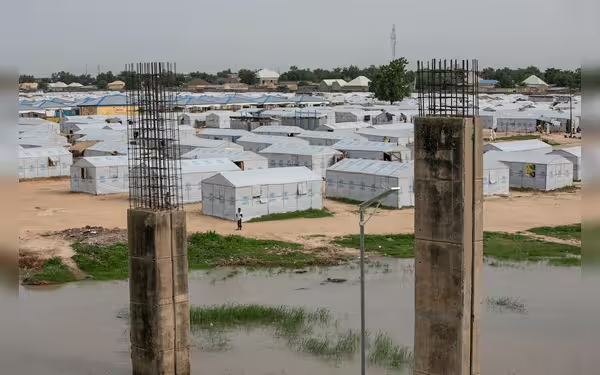Sunday, October 6, 2024 12:26 AM
Cholera Outbreak in Nigeria's Borno State Following Floods
- Cholera outbreak reported in Borno state.
- Nearly 2 million people displaced due to flooding.
- 300,000 doses of cholera vaccine distributed.
 Image Credits: arabnewspk
Image Credits: arabnewspkBorno state faces a cholera outbreak amid flooding, with nearly 2 million displaced and health risks rising.
In recent times, Nigeria's northeastern Borno state has faced a severe health crisis as a cholera outbreak has emerged amidst the devastation caused by flooding. This region, already grappling with the consequences of a prolonged Islamist insurgency, has seen nearly 2 million people displaced from their homes. The situation is dire, and the health of the affected population is at significant risk.
Cholera is a waterborne disease that can lead to severe dehydration and even death if not treated promptly. Unfortunately, Borno has a history of cholera outbreaks, primarily due to inadequate sanitation facilities and limited access to clean drinking water. The ongoing conflict has exacerbated these issues, pushing many people into overcrowded camps where hygiene is often compromised.
Baba Mallam Gana, the Borno Health Commissioner, reported that 17 confirmed cases of cholera have been identified, although there have been no reported deaths so far. However, the situation is alarming as the state is witnessing a rising number of cases of Acute Watery Diarrhea (AWD), which is closely linked to the recent floods. Gana noted that almost 500 cases of AWD have been recorded, with five local government areas being the most affected.
The flooding in Borno was triggered by heavy rains that caused a dam to overflow, leading to widespread displacement and damage to health facilities and infrastructure. In response to this health crisis, the state has received 300,000 doses of oral cholera vaccine (OCV) from the federal health ministry. These vaccines have been distributed across various displacement camps and communities that have been hit hard by the floods. Additionally, the state is anticipating an extra 600,000 doses to ensure that more people are protected against this deadly disease.
The situation in Borno serves as a stark reminder of the interconnectedness of health, environment, and conflict. As communities struggle to recover from the dual challenges of flooding and disease, it is crucial for both local and international organizations to step up their efforts in providing humanitarian aid and improving sanitation facilities. Only through a concerted effort can the people of Borno hope to overcome these challenges and rebuild their lives.













